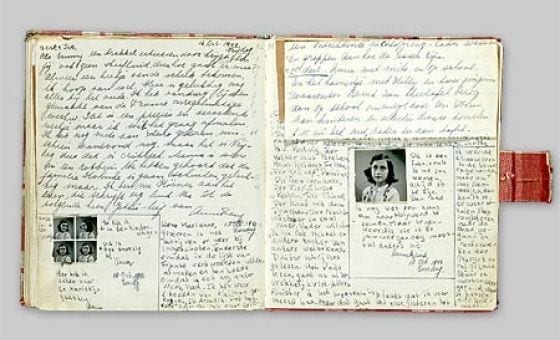How Writing a Diary Will Transform Your English Skills
Did you keep a diary or journal? We do! Not only is it great for recording memories, but it will completely transform your English skills. Read a few entries from our friend Julia’s journal. Julia has been journaling for almost one year now and she tells you all the reasons why she believes journaling can help to learn English. Keep reading for tips on how to get started and check out a list of writing prompts for keeping an English journal when you don’t know what to write about. Ready to start writing a diary?
Excerpts from Julia’s journal

Today is Monday. You know, that day of the week where we are supposed to start new projects and get things done. I started thinking about this journal, which I started almost one year ago. I tried to remember why I started writing here and then I remembered the reason. One day Ms. Harris, my English teacher, told me I should write more. She told me that after I told her I was having a hard time writing my assignments in English. I am pretty good at writing in my native language, but in English, everything seems a little more complicated.
When she told me I should write more, I asked her what topics I should write about. Then she surprised me by saying I should not write essays on politics or history, for instance. She wanted me to start journaling. “Journaling? That’s like writing a diary?” I asked her.
She told me that writing is a difficult task for most people. Writing in English for those who are not native speakers, like myself, can be even more difficult. Besides being confused by the grammar rules or not having a good and vast vocabulary to talk about a determined subject, most English learners focus on speaking and listening and forget about writing. “You know, it is difficult to become good at something that you don’t do frequently,” she told me.
Diary versus journal
I started thinking about the reasons why I didn’t write that much in English. Then, I realized that most of the time I had no idea of what to write about or the things I would like to write about were too complex. I used to give up writing about some topics whenever I started thinking about the words I needed to use and I didn’t know the translation in English.
A journal is all about writing about my life, my daily routine. And I always have something to say about my life, so I am never out of ideas. Besides that, the vocabulary is not that difficult and whenever I don’t know a word I can just check the dictionary for the translation.
PS: by the way, a ‘diary’ is different from a ‘journal’. I did some digging and apparently, a diary refers to the record of events in a notebook while a journal is a notebook where a person explores those events along with feelings, thoughts, and reflections.
The diary of Anne Frank and more

I didn’t do much today, so I won’t talk about my day in today’s entry. I will write about you. Yes, that’s right. I was curious to understand why people started writing in journals, so I did a little research and here is what I found.

People write in journals since they learned how to write, basically. People wrote journals in the 1600’s, for instance. They used them to keep track of accounting and public records. In the 1700’s world travelers such as Charles Darwin used journals to write down their discoveries.
Many writers and artists kept track of their lives and work in journals. Among those famous people we have Russian writer Leo Tolstoy and German writer Franz Kafka. Some journals were even published and read by people all over the world!
One of the most popular journals ever written is the one by Anne Frank. Anne was a German-Dutch girl of Jewish origin who is famous by having written a diary while she was in hiding with her family during the Nazi occupation of the Netherlands. The book is known as ‘The Diary of Anne Frank’ or ‘The Diary of a Young Girl’. I will read this book soon to get me inspired to write more.
Okay, that’s it for today.
Improving your English by journaling

As I mentioned the other day, I have been writing here for almost one year now. Besides writing way more, I have noticed (and my teacher, too!) that I have been making less grammar mistakes. That’s because whenever I’m writing I always take a look at my English textbook to make sure I am following the rules. I also noticed I have been using different sentence structures and I am not afraid of using the present perfect anymore — can you tell?
Besides that, I have definitely improved my vocabulary and spelling. I found out I didn’t know how to write a lot of words! I was used to saying them but writing them down is a whole other story. By using them almost daily I feel like I got so much better at spelling and I’m very happy with that. I love writing a diary!
Talk to you tomorrow.
Writing Prompts

I am sorry I didn’t write anything for the past couple of days. But I have a good reason for that. My English teacher asked me to share my journaling experience with my peers. I was nervous about talking about this in public, but it ended up being very fun!
I told them a little bit about the history of journaling and introduced them to Anne Frank. Did I tell you my mom bought me her book? Yeah, that was such a good surprise. I’m almost finishing it.
Well, going back to my presentation about journals…I have also told them that you don’t need much to get started. I like to write in a notebook, but I mentioned that there are several online journal platforms, such as Penzu, Momento, and Day One Journal.
Some of my peers questioned me about how to get started. I told them that after deciding if you’re writing with ink and paper or online, it is helpful to set a time to sit down and get it done. It is also important to find a good space to write.
I also remembered that my first journal entries were short. My very first entry is just a list. Do you remember that? Writing lists is a good start. After some time you will feel more comfortable with writing complete sentences and you will probably even write more than a page per day — I know I do!
My teacher also said something very cool. Whenever you have no idea of what to write about, you can search for writing prompts. Writing prompts are questions or topics that can help writers start their writing process whenever they feel stuck. She told me she would email me some writing prompts I can use on those days when I don’t feel inspired. I will print the list and share it here tomorrow, ok?
Bye!
List of prompts for journaling

As promised, Ms. Harris sent me the writing prompts list. Check it out:
- Talk about your favorite TV shows.
- Three things you can’t live without.
- The most embarrassing moment of my life was…
- The best compliments you have ever received.
- If you could meet any famous person, living or dead, who would that be?
- Talk about your parents.
- What’s your dream job?
I loved those ideas. I am excited to write about one of them tomorrow.
In the email, Ms. Harris also told me four students went to her office hours today to talk about journaling. She said my presentation really inspired them and I felt so proud of myself. I hope they start writing soon. I’m sure their English writing skills will get better in no time, just like it happened to me.
Talk to you tomorrow, okay? I think I will finish reading Anne Frank’s journal tonight.
We hope Julia’s journal inspires you to start journaling in English today. You will improve your vocabulary, you will learn more about grammar, your spelling will get better, and you will keep track of your life’s events. How cool would it be to show your grandchildren the journal you wrote back in 2020? Feel free to share your thoughts about how journaling can help to learn English in the comment section. Learn more about voice diaries here. Happy writing!

